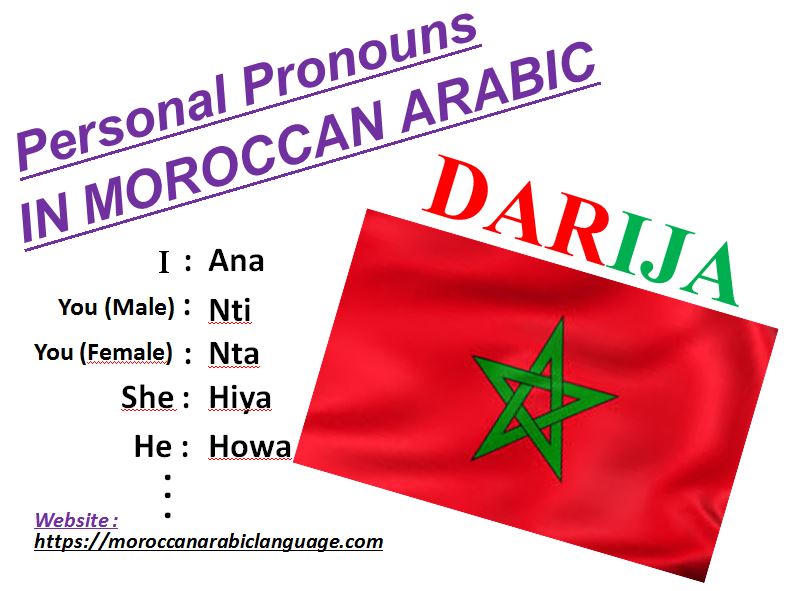In this lesson, we will see the eight Moroccan Arabic personal pronouns. Then, you can use them in simple sentences while you introduce yourself in DARIJA or have discussions and you are addressing one or a group of people…etc. In addition, we will see how we use these personal pronouns with Nouns, Adjectives, Verbs and the difference between personal pronouns in Standard Arabic “FOS7A” and Moroccan Arabic.
Contents
Moroccan Arabic Personal Pronouns
Ana = I
Nti = You (Addressing a Woman)
Nta = You (Addressing a Man)
Hiya = She
Howa = He
7na = We
Ntouma = You (Addressing either a Woman or a Man)
Houma = They
Personal Pronouns in DARIJA with Nouns and Adjectives
In case we have nouns or adjectives after the personal pronouns in DARIJA, you do not need the verb “to be” like in English for example.
Examples:
– Ana Ostad = I am Professor (Male).
– Nti zouina = you are beautiful.
– Nta ma7sad = you are jealous.
– Hiya Tbiba = she is a doctor.
– Howa Mrid = he is sick.
– 7na Far7anin = we are Happy.
– Ntouma machghoulin = you are busy.
– Houma 3yanin = they are tired.
Personal Pronouns in Darija with Verbs
In DARIJA, personal pronouns can be omitted with verbs, as you can usually identify the subject from the verb conjugation or the context of the discussion.
For example, if I say “Klit”, it’s clear that the subject is “I” and if we say “Klina”, it’s obvious the verb refers to “we”.
Klit = I ate
Klina = We ate
Personal Pronouns in Standard Arabic Vs Moroccan Arabic
This section is for persons who studied or are studying the Standard Arabic ” Fos7a ” and we will see the two differences between personal pronouns in Standard Arabic and Moroccan Arabic.
Dual Personal pronoun:
In Standard Arabic, we have a dual personal pronoun (You = أنتما and they = هما) and they are not used in DARIJA because more than one person is considered as a plural.
Plural Personal Pronouns:
In Standard Arabic, there are different plural pronouns for male and female while in Moroccan Arabic, for “you” and “they”, there are gender-neutral plural pronouns.
NB: As you can see above, in Moroccan Arabic, we do distinguish between male and female in the singular “you” (Nti for female and Nta for male).

